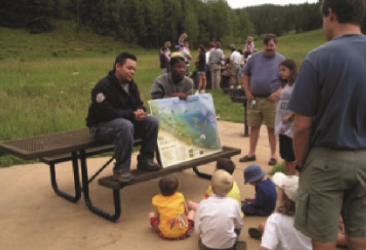An environmental educator may spend his/her day providing visitor services by explaining regulations, answering visitor requests, needs, and complaints, and providing information about a park and surrounding areas. Other times an environmental educator may prepare and present illustrated lectures and interpretive talks about park features or conduct field trips to point out scientific, historic, and natural features of parks, forests, historic sites, or other attractions. Environmental educators also may prepare informational brochures and write newspaper articles. An environmental educator may work outside in a natural setting or indoors at a museum, aquarium, zoo, or at a school. Many environmental educators are seasonal positions with variable hours including those during evenings and weekends.

 Back to Career Explorer
Back to Career Explorer

